This year, we’re going to be putting our day-after observations about Game of Thrones into writing, in a series we call Game of Thrones Unlocked. In keeping with our tradition, these will focus on explicating one scene as an interpretive key for unlocking deeper interpretations of the episode’s themes. These articles will contain spoilers through the episode under discussion. This week, Ryan Sheely tackles “The Broken Man” (S6 E7).
Right in the middle of this week’s episode of Game of Thrones, “The Broken Man,” we see three scenes in which one set of characters visit the home of another character and make a request. In the first scene in this set, Jon Snow, Sansa, and Ser Davos successfully petition the 10 year old Lady Lyanna Mormont of Bear Island for her support in reclaiming Winterfell from the Boltons. In the second, Jamie Lannister unsuccessfully attempts to convince the Blackfish (Catelyn Stark’s Uncle, Brynden Tully) to relinquish Riverrun without a protracted and deadly siege. In the final scene in this set, the Jon and Sansa #squad is back on the campaign trail in the North, this time at Deepwood Motte, failing to convince Lord Glover to join their cause.
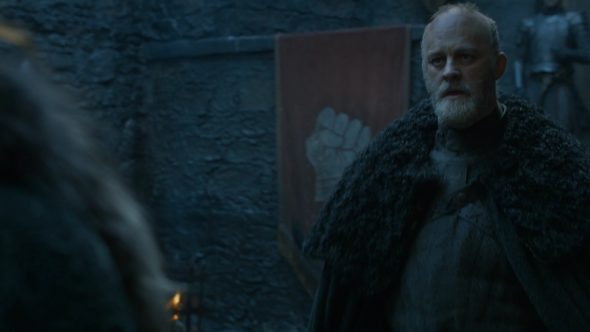
All three of these scenes explore the connection between houses—the family lineages that vie for power in Westeros—and homes— the physical castles that are those house’s seats of power. In the two scenes in the North, Jon and Sansa go into the homes of houses who have been aligned with the Starks for generations and call on that oath to help regain their own home— Winterfell. This appeal to the oath of loyalty to the Starks is not persuasive to Lord Robett Glover who says “House Glover will not leave our ancestral home to fight alongside wildlings” and asking where Robb Stark was when the Ironborn took Deepwood Motte. Loyalty of bannermen to the great houses they serve is a two way street— the bannerman have a duty to serve their Lord, but the Lords of the great houses have the duty to protect the homes of those who serve them. Because the Starks have not been able to provide this protection in any effective way since Ned’s death, Lord Glover prefers to take the protection of his home into his own hands rather than serve a House that may no longer be able to protect him. In his words, “I served House Stark once, but House Stark is dead.”
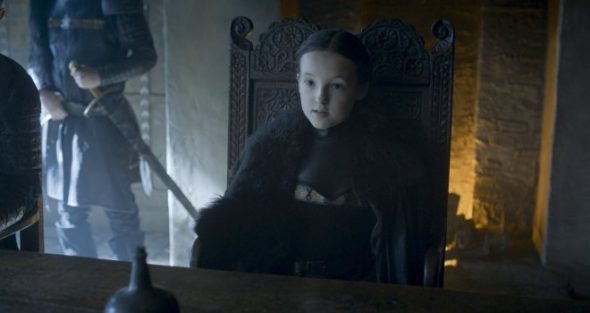
The pitch to the Lyanna Mormont, sassy tween ruler of Bear Island, almost crumbles under the weight of a similar counterargument. Although Jon and Sansa try to persuade Lady Mormont that “Rob is gone, but House Stark isn’t,” she immediately rebuffs their claim by pointing out that Jon is a bastard and Sansa has forsaken her Stark name by marrying into both the Lannister and Bolton families. Like Lord Glover, Lady Mormont resists getting pulled into someone else’s war, insisting that her responsibility as a ruler is to her home— Bear Island. However, Ser Davos ends up bringing her around by arguing that the real war isn’t between “a few squabbling houses,” but between “the living and the dead.” By reframing the quest not as one to just regain Jon and Sansa’s home of Winterfell, but a battle to save the shared home of the humanity from the Night King’s zombie army, Davos is able to reanimate House Mormont’s loyalty to House Stark.
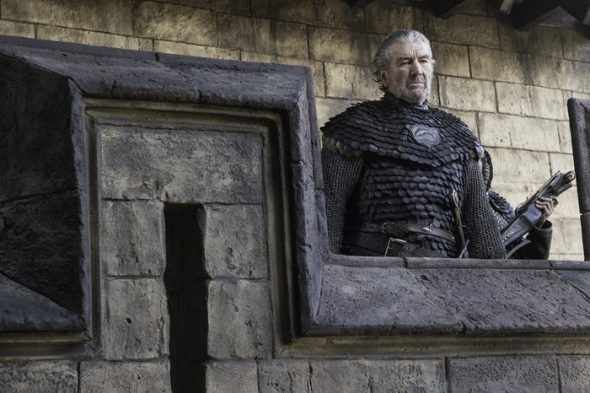
In both of these scenes, oaths and duty to use violence as protection are the connective tissue that link houses to their homes. This idea is also at the heart of the conflict between Jamie and the Blackfish. The Blackfish has retaken Riverrun because it is the ancestral home of the Tullys, who were the great lords of the Riverlands for generations. However, as part of the deal between Tywin Lannister and Walder Frey that culminated in the Red Wedding, the crown granted control over the Riverlands and Riverrun to the Freys. From the perspective of that pact, the Blackfish is “trespassing” by violating the agreement between the crown and the Freys. From the perspective of the Blackfish, Riverrun is his home and he’s not interested in any promises that Jamie will make to him about the safety of him and his men. Tellingly, the Blackfish rejects Jamie’s attempt to broker a deal by saying that “Bargaining with an oathbreaker is like building on quicksand.” Once again the connection between houses, homes, and oaths is clear— the physical safety of a home like Riverrun and a great house like the Tullys depends as much on promises and allegiances as it does on physical fortifications.
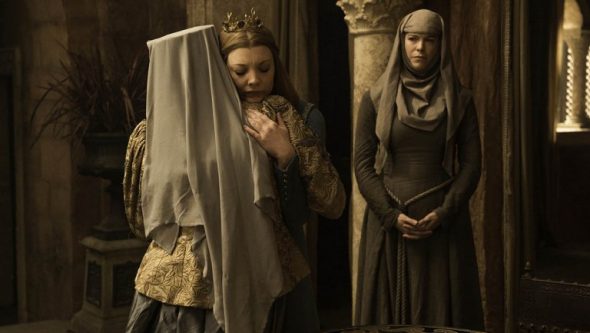
Outside of the North and the Riverlands, the linkages between duty, house, and home are also visible in King’s Landing. The High Sparrow menacingly reminds Margery of her duty to bear an heir for King Tommen and “preserve” House Baratheon (nevermind that everyone, including the Sparrow, knows that Tommen doesn’t have an ounce of Baratheon Blood). In the fanatical view of the Sparrow, the queen’s role is in the home, and more specifically in the marriage bed. In contrast, Margery’s conversation with her grandmother Olenna highlights Margery’s continued sense of duty towards House Tyrell. While Margery cloaks her insistence for her grandmother to “Go Home” to Highgarden in the language of loyalty to her husband and their newfound faith, the hand drawn sketch of a Rose (House Tyrell’s sigil) signals that her marriage, incarceration, and apparent conversion have not severed her deeper loyalty to her family’s house and home.
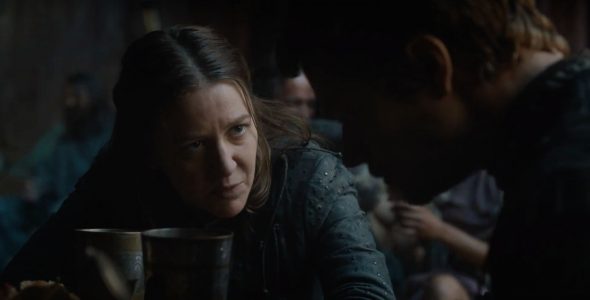
This set of themes around duty, houses, and home also connect to the homeward journeys of three characters: Theon, Arya, and the Hound. After being chased out of the Iron Islands by their uncle Euron, Yara and Theon Greyjoy find themselves without either a house or a home (but surrounded by plenty of breasts and butts). However, even though their journey back to their home will be a long one and will likely take them through Mereen, Yara’s speech to Theon while force feeding him ale is her attempt to bring him home psychologically. If he can’t help her in her quest to retake their home, then he is failing her in his duties as a brother. As she puts it, “If you’re so broken that you’re never coming back, cut your wrists.”
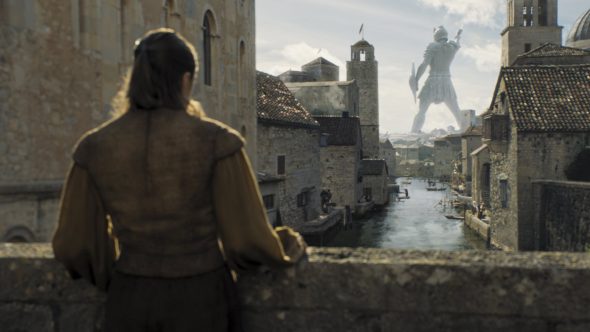
In Braavos, Arya is more than ready to drop the whole “a girl is no one” act and regain both her Stark name and some semblance of a home back in Westeros. However, as she stares past the Titan of Braavos, she is brutally reminded of the oath that she made to the Faceless men to serve the Many-faced God, when the Waif repeatedly stabs her in the gut. Although Arya manages to escape, we last see her bleeding out as she stumbles through the streets of Braavos.
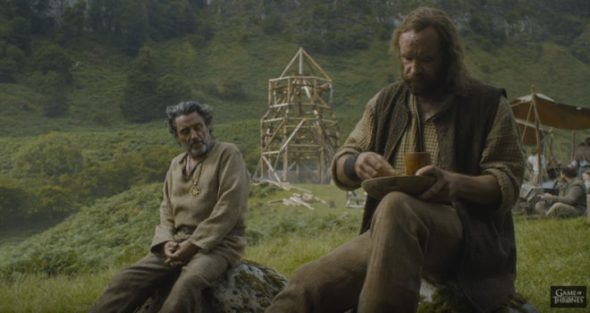
Speaking of characters who were bleeding out when we last saw them, the last big homecoming in this episode was the Hound (aka Sandor Clegane), who returned to the world of the living on the show after being severely wounded by Brienne and left for dead by Arya almost two full seasons ago. After the reveal in the cold open, we see Clegane living with a holy order, helping them to build a sept—a house of the gods. Septon Ian McShane (okay, he’s credited as “Ray,” but he’ll always be Septon McShane to me) insists that the Hound’s improbable survival is a sign that “Something greater than all of us has plans for Sandor Clegane.” In the folksy sermon later in the episode, Septon McShane argues that “it is never too late to come back,” advocating for salvation through good works and building a new community free from violence and hate. In contrast to most other religious leaders in Westeros, McShane’s Septon operates by a code of ethics that allows for a high level of acceptance and tolerance, which offers a path towards a new home for the Hound. However, when Clegane finds his entire religious community murdered by the Brotherhood without Banners and the Septon hung from the rafters of the Sept, the Hound grabs his axe, making it clear that he is indeed heading home, but that the road will be paved with blood.
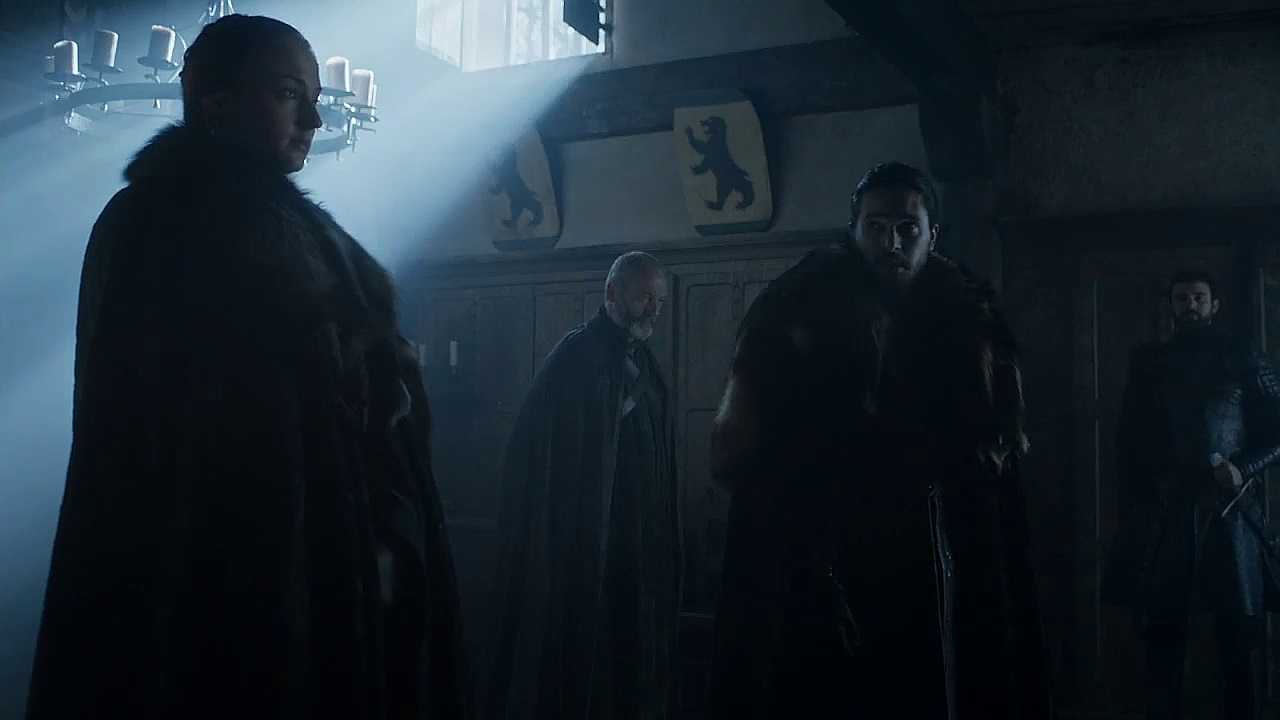
One of the secondary (or tertiary) themes of GoT is the examination of public institutions or lack there of. This episode looks at the Church of the Seven from two different angles. It also looks in on one of the oddest public institutions, the House of Black and White. I feel like there are more secrets there than we realize, and that Arya’s adventures there will end up being incredibly important to the plot. Fenzel spent some time on one of last seasons podcasts theorizing about why such a thing would even exist, but He didn’t get very far. I’d like to hear more discussion on this assassins guild, hidden in plain sight.
This is a great point. In general, there is kind of an interesting blurring of “public” and “private”, both in the church, and in the feudal relationships that I wrote about. On the one hand, you see the High Sparrow getting involved in Margery’s very private business. On the other hand, you have the Church of McShane that purports to be open access (a pure public good), and they get murdered and robbed (and their assets appropriated) by the Brotherhood without Banners.
Your comment about the House of Black and White being a public institution is really interesting as well. One does have a sense that they are public in some way, but I’m intrigued by the fact that the job that Arya refused to do seemed purely to be a very privately motivated hit by one actress on another. I’m wondering if there is some kind of a hybrid public/private arrangement in which the Faceless set of men have one function vis-a-vis the Iron Bank (or other public institutions in Braavos) and then another “killer for hire” function. I’m also wondering if these roles (or others) are explained in more details in the books.
I’ve found the House of Black and White to be a fascinating institution as well. The analogy I keep think of is to the ‘Deep State.’ Usually referring to an informal coalition of military, economic, and political actors in Turkey that work to keep the elected government from going too far from the ideals the Ataturk, the founder of the modern country. I often think of the Faceless Men as the Deep State of Braavos. The Iron Bank and the Sealords rule, but they know if they get too far from the ideals of Braavos then they might get stabbing by somewhere wearing the face of their grandmother. Also, they probably act as a paramilitary wing of the Braavos state, stabbing people who threaten it.
Drawing the analogy out further (maybe to the breaking point) maybe Arya will end up being Tayyip Erdogan, the current Turkish PM who has weakened the Deep State.
I have one quibble with your Deep State of Braavos theory of the Faceless Men ( and the House of Black and White by extension).
The Deep State of Turkey ‘safeguards’ the ideas of the secular state as stated by Ataturk. But I don’t think the Faceless Men ever safeguard the highest idea of Braavos.
In the books they make it clearer that the main ideal of third city isn’t commerce or anything like that, but fervent opposition to slavery. The city was founded by runaway Valyrian slaves (and remained hidden while Valyria was in power). It was Braavosi military, economic and political might that forced the city states on the west coast of Essos to ban slavery and become the Free Cities.
And yet, a Faceless Man tried to kill Daenerys after she’d brought down the masters of slaver’s bay. Seems to me that if the Facelss Men were the guardians of the ideals of Braavos, they wouldn’t be trying to kill the Breaker of Chains. Especially since, economically, Braavos probably competes heavily with Volantis, and Slaver’s Bay more generally. The merchants and bankers of Braavos would likely appreciate seeing a competitor that thrives on a morally repugnant system crippled by the Mother of Dragons.
An excellent quibble. It’s been a couple years since I’ve read the books, so I don’t remember a faceless men sponsored assassination attempt on Daenerys.
Though one of the problems with a ‘Deep State’ is that they get to pick what they think the ‘highest ideals’ are. Maybe the faceless men think killing dragon queens is more important then freeing slaves? They don’t seem too concerned about slavery in slaver’s bay, and there are some theories floating around that the faceless men had some hand in bringing about the Doom of Valyria.
Your point from below is very good. I agree a lot of the reason the faceless men are generally accepted in Braavos is their history and tradition with the city, and their connection to the relatively charitable House of Black and White. I would disagree however that it is not public knowledge that the two are deeply connected. From both the books and the show I get the impression that most people know where to go to ‘hire’ a faceless man; from the Small Council in Westros, to the actress, to the widow who wanted the thin man dead, to even random ship captains who knew exactly where to bring a girl carrying a specific coin. There doesn’t seem to be any confusion about where faceless men can be hired.
The deep state was the best real world analogy I could come up with to help explain why Braavos seems so accepting of a magical assassins/death cult in their city. I am very curious if anyone has any other thoughts….
In the book there’s one attempt on Dany’s life on the docks (foiled by Barristan Selmy) that is explicitly said to be by a Faceless Man, likely hired by Robert Baratheon before he dies. I believe that the attempt on her life in the fighting pit is also suspected to be by them.
You know, you’re right about the coin. I’d kind of forgotten about that. For some reason, how I imagined you hired a Faceless Man is by vaguely asking ‘if anyone knows a guy who could help out with a hypothetical problem, one might be having that they’d be glad to pay good coin to fix, hypothetically, of course.’
I guess I just don’t see a coherent enough goal from the Faceless Men and bankers of Braavos (and do we know these two institutions have links beyond geography?) to see it as a deep state like entity. The analogy I see for the FM is more like the dark cabals of conspiracy theorists. A group of people holding great power and using it to exploit the levers of powers in service to some convoluted plot aimed at some nefarious secret goal.
A home in this context means physical safety, yeah? Whereas “house” means “people you care for.” It’s probably significant that Septon McShane and his flock got cut down in the middle of a half-built building. They had a “house” but no “home,” and this turns out to be a risky situation. And it’s a situation that a lot of the more likable characters have got themselves into: Theon and Yara, Jon and Sansa, Margaery and Oleanna. They are banking on their ability to protect themselves by pulling together as a family. Well. To a greater or lesser extent. Yara is all-in on this gamble, Sansa has her doubts (which is why she’s going behind her brother’s back), and the Tyrells are screaming and running for the hills.
But if “house” without “home” is risky, there’s also something unseemly about having a “home” without a “house” (i.e. physical safety but no friends and family to rely on). This is sort of the situation that Cersei and the Blackfish have gotten themselves into.
p.s. Jaime’s little speech about not making death threats if you don’t plan to honor them was pretty cool. But someone should have read it to whoever’s writing the Arya plot.
Wait, there it is.
Stabbity Wabbity
Not-nameless Arya Stark
Stumbles offstage leaking
Red from her gut.
Pseudo-cliffhanger-ish
Tension. She BLEEDS to death?
Yeah, and then monkeys fly
Out of my butt.
When someone threatens to kill you, and then stabs your repeatedly in the gut, I call that a threat effectively carried through.
Yeah, the Waif isn’t the one making idle threats. The writers are making idle threats: they want us to be like, “oh no, is Arya gonna die?” But there’s no WAY that she goes out like this — and so all the threat does is make them look silly.
Seriously, I think it’d have been better from a storytelling perspective to squeeze the confrontation and its aftermath into a single episode. Presumably the reaction they wanted to get from their cliffhanger was something other than “Oh whatever” [rolls eyes].
I cannot tell whether I’m reading subtext or if it is just wishful thinking, but I got the sense in the Yara/Theon scene that the show is working towards shipping Daenerys and Yara.
The scene calls to my mind the Volantis brothel scene from last season, where Jorah is pining after Daenerys. Then, in this scene, we see that Yara is sexually attracted to women. Additionally, Yara’s attempt to give Theon his identity back parallels Daenerys’s relationship with the Unsullied.
Given Daenerys’s taste in partners-favoring the bloodthirsty-Yara would make a good match: the Ironborn culture is essentially the Dothraki culture, but with boats and ships instead of horses.
I meant to post this last week, but then didn’t. Hopefully some of you still find it of interest:
From what I remember of the books, the Faceless Men are not the public face of the institution (pun very much intended) of the House of Black and White. In fact, I’m not even sure it’s even public knowledge that the Faceless Men are connected to it.
For the city of Braavos, The House of Black and White acts as a mix between an airport chapel and a free euthanasia clinic. The most important role it fulfills is to extend ‘mercy’ and comfort to people for whom death is the only recourse left. [It’s important to note that in this facet, The House of Black And White is a universal and free public service. It funds itself through whatever money or valuables people have on them when they choose to end their lives. It’s only the Faceless Men who charge to give the gift. In essence, suicide is free but murder is expensive.]
The other part of its service or its mission, which gets fairly short shrift on the show, is that it’s actually a house of worship. The books the place as a lot of small rooms and alcoves in which there are a handful of sculptures or representations of various gods of death from faiths from around the world. (The Stranger for people who worship the Seven, for example). The idea being that when you do take your life, you can take comfort in praying to your own god(s).
This is important for a city like Braavos, not only because it’s a port city full of people from around the world, but because it was founded by runaway slaves who likely didn’t all worship the same gods. It sets The House of Black and White (and Braavos more generally) apart from many of the other cities and cultures in the GoT world. It’s one of the few where a sort of freedom of religion is practiced and cherished.
Of course, for the people running the House of Black and White, who turn out to be the Faceless Men, all religions are the same because they all ultimately worship the one god who truly matters: Death.
It’s also important to keep the history of both Braavos and The House of Black and White in mind when talking about it as an institution. If I remember correctly, The House of Black And White is one of the oldest buildings in the city, built on one of the oldest settled islands (Braavos, based loosely on Venice is made up of various islands connected by bridges and fill, surrounded by a lagoon). Braavos, in turn was founded by runaway Valyrian slaves and served as a hidden refuge for them while Valyria was in power. Once Valyria fell, Braavos revealed itself and rose to become one of the most powerful cities to emerge in the chaos of the collapsing empire.
The first Faceless Men were also Valyrian slaves, but their way of helping their fellow slaves was to give them the gift of death to end their misery. We are led to understand that those first Faceless Men were there with the runaways that founded Braavos. They founded the House of Black and White and the Faceless Men as organized institutions. But they split their missions into two, one public, one hidden. Yet, they both, in a way align with the ‘mission’ of the city itself. Braavos was there to free people from the misery of slavery; the House of Black and White (and the Faceless Men working out of its hidden chambers) was there to free people from the misery of life itself.